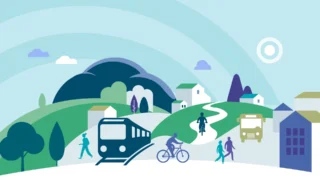//
Introduction
The Department of Transport, Tourism and Sport has opened a public consultation to review Ireland’s sustainable mobility (active travel and public transport) policy. Sustainable Mobility refers to active travel, such as walking and cycling and public transport (e.g. bus, rail, tram). This review is part of a commitment in the Programme for Government to review public transport policy “to ensure services are sustainable into the future and are meeting the needs of a modern economy”.
This public consultation is an opportunity to give stakeholders, interested parties and the public the opportunity to contribute to the development of a Sustainable Mobility Policy. The public consultation will commence on 14th November 2019 and conclude on 24th January 2020, see here for details.
Transport accounts for 20% of Ireland’s greenhouse gases[1]. The population is forecast to grow by around 1 million people by 2040 with over 600,000 extra jobs forecast (Project Ireland 2040). Almost €7 billion of taxpayer funds have been spent on sustainable mobility services and infrastructure since 2009. How we travel is important and the plans we make for future travel will have significant impacts in the context of funding, climate change and quality of life.
The Department of Transport have published a range of background papers examining various different aspects of sustainable mobility and setting out questions designed to help develop the new policy framework, see here for links to background papers.
Background Papers
Paper 1 focuses on transport accessibility and asks what are the priorities to improve public transport accessibility for people with disabilities, elderly or those with mobility difficulties.
As Ireland is an ageing society we need to consider mobility challenges more.
The paper on Active Travel (Paper 2) examines issues in relation to promoting more active travel such as walking and cycling.
Paper 3 examines the Climate Change Challenge and asks which sustainable mobility emissions mitigation measures, that are not currently employed should be considered? It also asks how mitigation measures should be prioritised, for example on the basis of least cost, carbon, abatement potential, disruptive effects, co-benefit potential etc.?
Paper 4 examines congestion and asks what are the opportunities and challenges around reducing traffic congestion in our cities and other urban areas? A recent report by the Department of Transport see here. estimated the annual value of time lost to road users due to aggravated congestion in the Greater Dublin Area (GDA), at €358 million in 2012 and is forecasted to rise to €2.08 billion per year in 2033. These estimated costs do not include other costs, for example, increased fuel consumption and other vehicle operating costs, or increases in vehicle emissions or the impacts of congestion on journey quality.
Additional demand management measures should be considered for example congestion charging/road pricing.
The WDC also believes that demand management measures such as an increase in e-working/remote working should be supported, see the discussion in a recent blog post here. Increased e-working can also help significantly reduce emissions. The Government have just published the Remote Work in Ireland report which supports greater flexible working practice and can be read here.
Paper 5 examines Greener Buses and asks what challenges and issues need to be considered in relation to transitioning alternative fuel options for the urban bus fleet?
Paper 8 focus on public transport in Rural Ireland which of particular concern to the WDC. The Western Region is a very rural region: 80% of the population live in areas outside of towns of 10,000, compared to 49.8% for the State. Lower population densities may mean that a different model of public transport provision should apply compared to that in cities.
There are also papers examining Regulation (Paper 8), Funding (Paper 9) and a Review of actions on the Smarter Travel Policy.
The Department are inviting comment on any and all these issues and this is an opportunity to influence the preparation of Transport policy over the next decade at least. The public consultation will conclude on 24th January 2020 and all the detail is available here.
Deirdre Frost
[1] Climate Action Plan 2019




